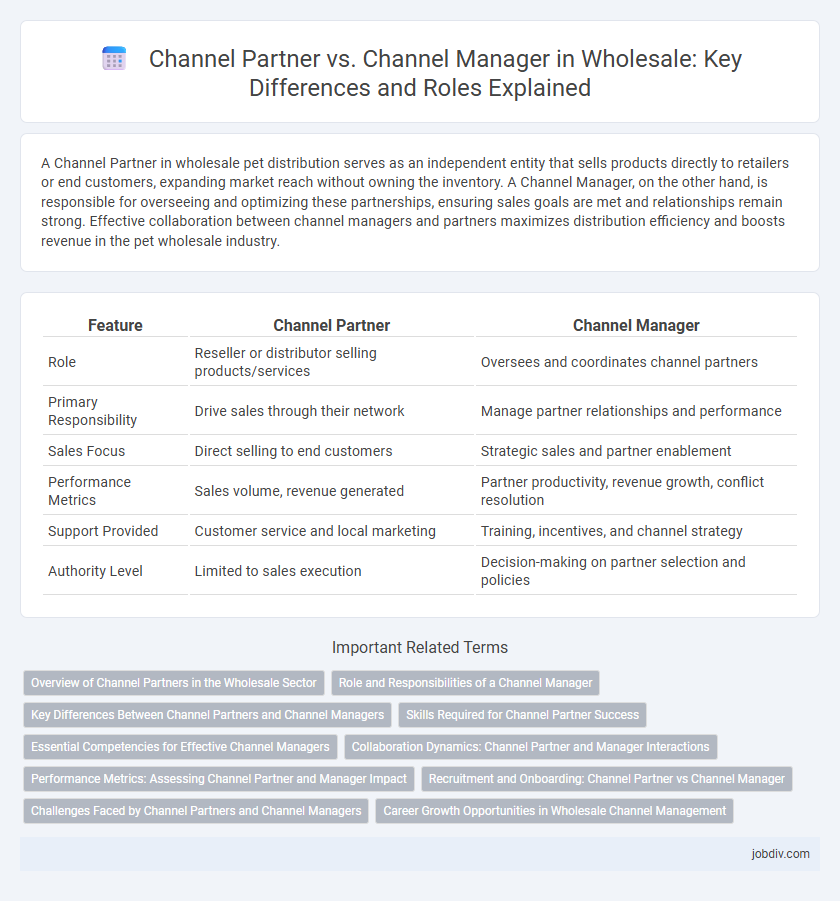A Channel Partner in wholesale pet distribution serves as an independent entity that sells products directly to retailers or end customers, expanding market reach without owning the inventory. A Channel Manager, on the other hand, is responsible for overseeing and optimizing these partnerships, ensuring sales goals are met and relationships remain strong. Effective collaboration between channel managers and partners maximizes distribution efficiency and boosts revenue in the pet wholesale industry.
Table of Comparison
| Feature | Channel Partner | Channel Manager |
|---|---|---|
| Role | Reseller or distributor selling products/services | Oversees and coordinates channel partners |
| Primary Responsibility | Drive sales through their network | Manage partner relationships and performance |
| Sales Focus | Direct selling to end customers | Strategic sales and partner enablement |
| Performance Metrics | Sales volume, revenue generated | Partner productivity, revenue growth, conflict resolution |
| Support Provided | Customer service and local marketing | Training, incentives, and channel strategy |
| Authority Level | Limited to sales execution | Decision-making on partner selection and policies |
Overview of Channel Partners in the Wholesale Sector
Channel partners in the wholesale sector act as intermediaries, distributing products from manufacturers to end customers while expanding market reach and driving sales growth. They include wholesalers, distributors, agents, and resellers who leverage established networks and customer bases to optimize product availability. Effective channel management maximizes partner performance by providing strategic support, training, and resources tailored to each partner's unique market position.
Role and Responsibilities of a Channel Manager
A Channel Manager is responsible for developing and maintaining relationships with channel partners to drive sales growth and market expansion. They oversee partner performance, provide training, and ensure alignment with company strategies and goals. Their role includes managing partner onboarding, monitoring sales targets, and facilitating communication between the company and its channel partners.
Key Differences Between Channel Partners and Channel Managers
Channel partners are external entities such as distributors or resellers that sell products on behalf of a company, while channel managers are internal employees responsible for developing and overseeing these partnerships. Channel managers focus on strategy, training, and support to optimize the sales performance of channel partners. The key difference lies in ownership; channel partners operate independently to drive sales, whereas channel managers coordinate and manage these external relationships for business growth.
Skills Required for Channel Partner Success
Channel partners require strong relationship-building skills, product knowledge, and market insight to effectively promote and sell wholesale products, ensuring alignment with channel strategies. Channel managers need leadership capabilities, negotiation skills, and data-driven decision-making to support partners, optimize channel performance, and drive revenue growth. Both roles benefit from excellent communication, problem-solving, and adaptability in a competitive wholesale environment.
Essential Competencies for Effective Channel Managers
Effective channel managers demonstrate strong communication skills, deep understanding of market dynamics, and proficiency in managing partner relationships to drive wholesale success. They excel in strategic planning, conflict resolution, and performance analysis to optimize channel partner engagement and sales growth. Essential competencies also include adaptability, negotiation expertise, and the ability to align partner goals with organizational objectives for profitable collaboration.
Collaboration Dynamics: Channel Partner and Manager Interactions
Channel Partner and Channel Manager interactions revolve around fostering effective collaboration to drive sales growth and market penetration. Channel Managers coordinate strategy implementation, provide training, and offer support to Channel Partners, ensuring alignment with business objectives and maximizing channel performance. Strong communication, trust-building, and shared goal-setting are critical elements that optimize these collaboration dynamics and enhance overall wholesale distribution success.
Performance Metrics: Assessing Channel Partner and Manager Impact
Performance metrics for channel partners include sales revenue, market penetration, and customer acquisition rates, directly reflecting their contribution to wholesale growth. Channel managers are evaluated based on partner enablement, retention rates, and the effectiveness of training programs driving partner success. Accurate assessment of these metrics ensures optimized collaboration, improved channel efficiency, and increased overall sales performance in wholesale distribution.
Recruitment and Onboarding: Channel Partner vs Channel Manager
Channel Partner recruitment targets businesses that can resell or distribute products, focusing on strategic fit and market reach, while Channel Manager recruitment prioritizes skills in partner relationship management and sales enablement. Onboarding for Channel Partners involves product training, sales tools, and marketing support to empower partners, whereas Channel Manager onboarding emphasizes leadership, partner program execution, and performance tracking. Effective recruitment and onboarding align channel strategies with business growth, ensuring channel partners drive revenue and channel managers optimize partner ecosystems.
Challenges Faced by Channel Partners and Channel Managers
Channel partners often face challenges such as limited market reach, complex product training requirements, and difficulties in aligning with the vendor's sales strategies. Channel managers encounter obstacles including managing diverse partner expectations, ensuring consistent communication across multiple channels, and measuring partner performance effectively. Both roles require strategic coordination to optimize sales pipelines and improve overall channel efficiency in wholesale distribution.
Career Growth Opportunities in Wholesale Channel Management
Channel partners in wholesale build market presence by leveraging collaboration and client relationships, often progressing into roles like channel manager through demonstrated sales success and strategic acumen. Channel managers drive growth by designing partner programs, optimizing sales pipelines, and managing channel conflicts, offering career growth opportunities in leadership, strategic planning, and cross-functional management. Developing expertise in wholesale channel dynamics enhances prospects for senior positions such as regional channel director or global partner manager.
Channel Partner vs Channel Manager Infographic

 jobdiv.com
jobdiv.com